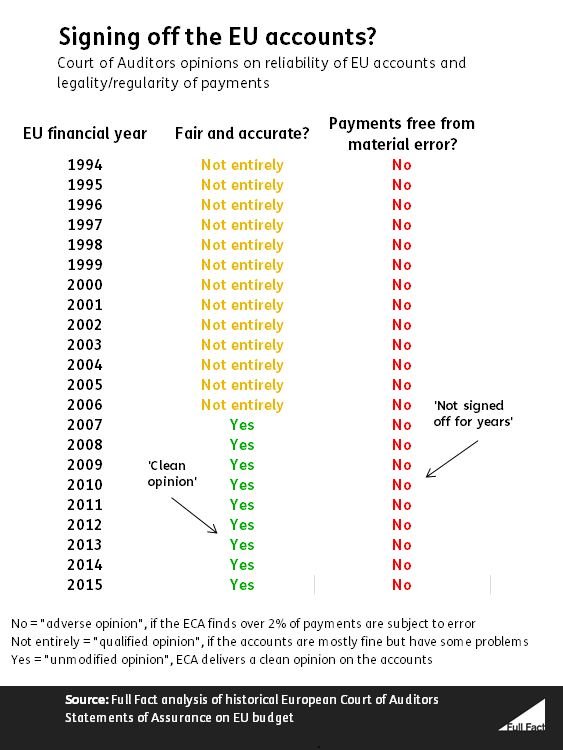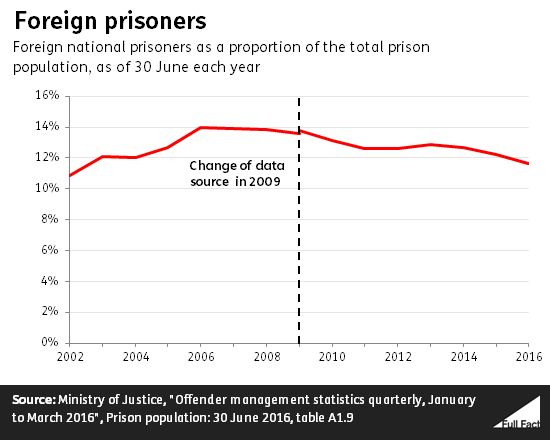BBC Question Time, factchecked
Join 72,953 people who trust us to check the facts
Sign up to get weekly updates on politics, immigration, health and more.
Subscribe to weekly email newsletters from Full Fact for updates on politics, immigration, health and more. Our fact checks are free to read but not to produce, so you will also get occasional emails about fundraising and other ways you can help. You can unsubscribe at any time. For more information about how we use your data see our Privacy Policy.
“Mr Clarke, why can't we deal through the World Trade Organisation with the European Union, as all the rest of the world do?”
Audience Member, BBC Question Time, 20 October 2016
It’s not correct that the “all rest of the world” trades with the EU under World Trade Organisation (WTO) rules.
As part of the EU, the UK faces no formal trade restrictions when it trades with other countries in the EU single market.
If it leaves without negotiating an alternative trade agreement, UK businesses will trade with EU businesses under WTO rules.
The rules say that the EU generally has to apply the same tariffs (taxes on imports and exports) to every WTO member country it trades with.
But there are exceptions.
Tariffs don’t have to apply equally to countries that are part of a regional free trade agreement or customs union.
The EU has finalised 48 trade agreements which make it easier for businesses to trade across borders, some of which apply to trade with multiple countries. There’s differences of opinion about whether the UK will have to renegotiate all these deals outside of the EU.
With no alternative trade agreement, UK businesses would face higher tariffs than those other non-EU countries.
We’ve previously published pieces on:
- What it means to be in the EU single market
- Options for trade arrangements after the UK leaves the EU
- The current state of UK trade with other EU countries
“The audit for the European Union has not been written off in 20 odd years”
BBC Question Time audience member, 20 October 2016
It depends on what you think ‘written off’—or ‘signed off’—means.
Auditors say the EU’s accounts are accurate and have been since 2007, but for the last 20 years they’ve also recorded significant errors in how money is paid.
It’s a bit like having a bank account that accurately records the transactions you’ve made, but some of them still shouldn’t have happened in the first place.

Only a small minority of errors are proven cases of fraud, where people have deliberately tried to get money illegitimately, and the EU does recover some of the lost money later.
“Our prisons are filling up with foreigners”
BBC Question Time audience member, 20 October 2016
Foreign citizens make up 9% of the general population and 12% of the prison population in England and Wales.
Around 5.2 million people were citizens of another country in 2015, according to estimates from the Office for National Statistics.
That estimate can be set alongside the headcount of prisoners in English and Welsh jails, which records just under 10,000 foreign national prisoners as of June 2016.
The number and proportion of foreign prisoners is falling: there were over 11,000 foreign prisoners in 2010.

There are no readily available figures for those in prison who are born abroad.
“The issue of X-raying children's teeth, it wouldn't work. The experts say it wouldn't work.”
Angela Rayner MP, 21 October 2016
Dental experts say that tooth X-rays aren’t a particularly precise method of establishing a person’s exact age, although they can help narrow it down. Their concerns are moral as well as scientific.
The British Dental Association has described such tests, in response to the suggestion that young people coming over from Calais should have to take them, as “ineffective, inappropriate and unethical”.
It says that “wisdom teeth can erupt from the age of 10, and do not appear in some adults. These x-rays can therefore only provide an estimate of a patient's age range”.
Professional guidance for children’s doctors says that:
“estimates of a childs physical age from his or her dental development are accurate to within + or - 2 years for 95% of the population… for older children, this margin of uncertainty makes it unwise to rely wholly on dental age”.
But that doesn’t mean it’s a useless tool. Showing that somebody is very likely aged between 21 and 25, say, is a good indication that they are over 18.
Home Office guidance says that asylum applicants will sometimes submit dental tests as evidence that they are a child. “There will be cases where such reports should be given considerable weight—for example because the applicant’s claimed age is within the possible range”.
But dentists and doctors see a difference between a voluntary test and a state-imposed one. X-rays, after all, involve exposure to radiation. The BDA says it has resisted efforts by the government to make asylum seekers “undergo a medical procedure without their informed consent and without any planned clinical benefit” for over a decade.
“You [UKIP] wanted to privatise the National Health Service.”
Angela Rayner MP, 20 October 2016
“No, one person said that, read our manifesto, we do not want to privatise the NHS…. we’re very clear about that.”
Lisa Duffy, 20 October 2016
There was no mention of privatising the NHS in UKIP’s manifesto for the 2015 election.
It quoted UKIP MEP Louise Bours saying “UKIP has a clear vision for 21st century healthcare: an efficient, affordable, world-class, national health service, free at the point of delivery and in time of need”. It also committed to funding the NHS to the tune of an additional £3 billion over the 2015 to 2020 parliament and to get rid of the Private Finance Initiative which it described as a way to “privatise the NHS by the back door”.
However, in a public meeting in 2012, Nigel Farage said “I think we are going to have to think about healthcare very, very differently. I think we are going to have to move to an insurance-based system of healthcare. Frankly, I would feel more comfortable that my money would return value if I was able to do that through the marketplace of an insurance company, than just us trustingly giving £100 billion a year to central government and expecting them to organise the healthcare service from cradle to grave for us".
Mr Farage has since said that “Ukip is 100 percent committed to keeping the NHS free at the point of use for all British nationals, and the service should be funded out of general taxation”.